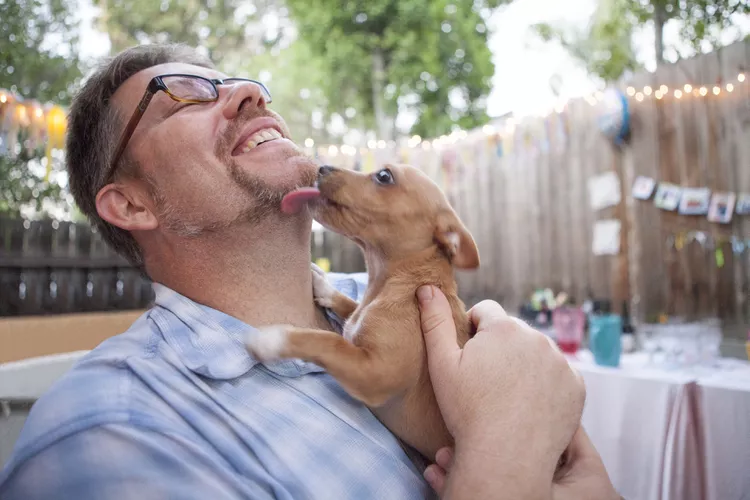Hypoglycemia in Puppies and Small Dogs

Hypoglycemia, commonly called low blood sugar, affects puppies and small dog breeds much more often than the average adult dog. Untreated, low blood sugar can cause coma, seizures, and death. Special care must be given to puppies and small dogs to prevent episodes of low blood sugar. Here's what pet parents need to know about hypoglycemia in puppies and small dog breeds.
What Is Hypoglycemia?
Hypoglycemia refers to a state of low sugar in the bloodstream. Although it can affect any dog, it's most common in small puppies and toy breeds like the Chihuahua or Pomeranian. Puppies and toy dog breeds have higher metabolic rates and energy requirements for their mass than larger adult dogs. Adult dogs also have higher liver storage that helps produce energy when blood sugar is low. However, immature livers can’t manufacture enough sugar to maintain some puppies through times of stress or food shortage, so tiny pups are more likely to develop hypoglycemia.
Symptoms of Hypoglycemia in Puppies
The signs of low blood sugar can be subtle. It’s important to watch out for them, especially if you have a small puppy or a toy-breed adult. Without enough sugar, a dog’s heart rate can become slow and irregular and breathing may become slow, irregular, and shallow triggering a cascade of progressively serious symptoms leading to circulatory collapse. Hypoglycemic dogs may also present with rapid heart rate and breathing.
Contact a veterinarian immediately if you notice any of the following atypical behaviors and symptoms:
- Weakness
- Lethargy
- Sleepiness
- Disorientation
- Wobbly gait or stumbling
- Twitching, shaking, trembling, or shivering
- Seizures
- Unconsciousness
When the blood sugar drops, dogs can’t regulate their body temperature, so they become cold and drowsy. The lack of available sugar in the bloodstream also affects nerves, inducing clumsiness, shivering or tremors, and even full-blown seizures. Untreated, a coma may ensue, and the dog may die if it does not receive sugar.
What Causes Hypoglycemia in Puppies and Small Dogs?
Dogs can develop low blood sugar for a few reasons, but the exact cause may require veterinary assistance to identify. All of the following can cause low blood sugar and have similar symptoms:
- Intestinal parasites that compromise digestion
- Irregular feeding schedule or lack of food
- Low sugar storage in liver
- High metabolic rate
- Low body mass
- Portosystemic shunt (abnormal blood vessel around the liver)
Hypoglycemia in puppies usually happens because juveniles lack sufficient glucose stores in their bodies to sustain them through stressful events or fasting periods. Small and toy breeds may develop hypoglycemia due to low body mass compared to their energy needs.
Hypoglycemia can also occur in diabetic dogs, especially if they get more insulin than needed.
Diagnosing Hypoglycemia in Puppies
Veterinarians use multiple approaches to diagnose hypoglycemia in dogs. In addition to considering symptoms and medical history, the vet will perform a physical exam and may recommend lab work, such as CBC (complete blood count), serum biochemistry profile, and urinalysis. Depending on the results of the lab work, your vet may suggest further testing, such as X-rays or an ultrasound, to look for physical abnormalities.
How to Treat Hypoglycemia in Dogs
Fortunately, when you recognize the signs of hypoglycemia in a puppy or toy breed (such as stumbling or sudden sleepiness), the condition is easy to reverse at home by giving the dog sugar. In almost all cases, the dog will respond very quickly to treatment, within 10 minutes.
Getting sugar into the dog's mouth is key because it will resolve the acute hypoglycemic episode. A highly concentrated sugar source like corn syrup, maple syrup, or honey should work. Spoon or drip about a teaspoon of syrup into the dog's mouth, or rub a little on the gums.
If your puppy has a seizure or falls unconscious, place a few drops of the sugar liquid directly onto the dog's lips and gums. Next, bring your dog to the veterinarian as soon as possible for further evaluation and treatment.
Even when your pup responds quickly to a sugar source, it’s a good idea to schedule a prompt veterinary exam to assess the cause and determine preventative measures to avoid future episodes of low blood sugar.
Prognosis for Puppies with Hypoglycemia
With an attentive owner who is ready to administer sugar support, a hypoglycemic dog can recover from an acute episode very quickly. The long-term prognosis, however, can vary according to the underlying cause of the low blood sugar, and the condition may need to be managed with diet or medications for life.
How to Prevent Hypoglycemia
When your dog has suffered from a bout of hypoglycemia, you’ll know to be alert for the signs of low blood sugar in the future. You can also take steps to prevent the problem, especially if your dog is a high-risk pet.
- Schedule several meals every day. Young puppies and small dogs may have trouble eating enough food in one sitting. A small meal several times a day helps keep the blood sugar levels normalized.
- Keep dry food available all day for intermittent snacking. You can measure this amount to regulate how much food the puppy is eating daily. This will help prevent puppy obesity while providing healthy blood sugar levels.
- Add one to two tablespoons of corn syrup to your dog’s water for all-day sipping. Be sure to empty and clean the bowl and make a fresh bowl each day or the sugar water could grow bacteria.
Most adult dogs won’t have problems with hypoglycemia unless they are exceptionally small for their age. However, playing and running too hard without rest can cause low blood sugar even in medium and large-breed adult dogs.